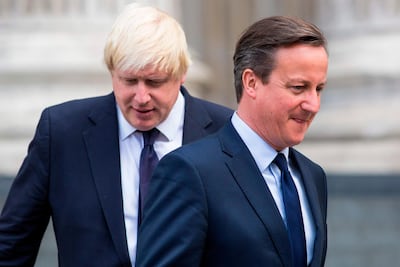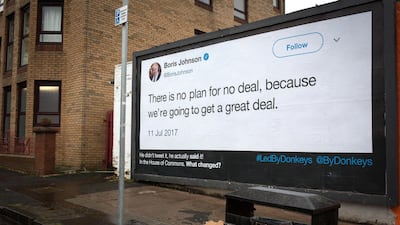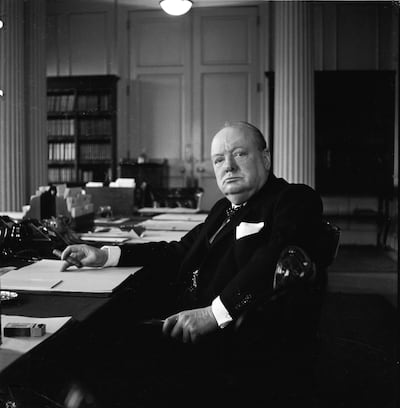Over the past few weeks, I have been travelling around the UK speaking to diverse groups about the future of Europe and the prospect of Brexit. Most of these public meetings are fun. Some are truly inspiring but a few are a puzzle. Conway Hall is a famous London landmark, historically a venue of civilised debate on ethical issues. I spoke there on the topic of “the normalisation of lies in public life”. We all tell lies occasionally and we know it is wrong, yet sometimes we do it so as not to cause offence.
“Yes,” we say, “I loved that shirt you gave me for my birthday.” Or: “Yes, your new hairstyle suits you.”
We are also often not truthful when purchasing something online when forced to tick a box showing we have read the terms and conditions. Have you ever read the terms and conditions? Me neither. I cannot ever remember reading thousands of words of T&C legalese.
At the Conway Hall meeting, when talking about lying in public life, I was asked a question by a woman who said she had voted for Brexit in the referendum of 2016. When someone says: “I voted for Brexit”, I always ask which version of Brexit they voted for, since more than three years later, we still cannot agree what Brexit means.
“I voted for a ‘clean Brexit’,” the woman said confidently, explaining that meant “leaving the European Union with no deal on October 31”.
Unfortunately nearly every part of that sentence is impossible.
The words “clean Brexit” only became fashionable after a book of that title was published in August last year - not when we voted two years earlier. Moreover, the words “clean Brexit” have no real meaning, rather like previous Brexit slogans of having deals called “Canada-plus”, “Norway-plus” or “managed no deal”. Once you add in the word “plus” or “managed” to any “deal”, it can mean anything you want it to mean.
But the woman could not have voted as she now thinks she did for other reasons too. No deal was never an option on the 2016 Brexit referendum ballot paper. Prominent politicians wanting Brexit – Nigel Farage, Michael Gove and Boris Johnson – explicitly stated that Britain would leave the European Union with a deal and, so they claimed at the time, a very good deal because, as they put it, “we hold all the cards”. Finally – and most obviously – in June 2016, no date was fixed for leaving the EU, so the woman could not possibly have voted to leave on October 31, 2019. That date was only fixed in March this year, and even now it might not happen.
The puzzle is how a decent, articulate human being like this voter could so profoundly delude herself about easily verifiable facts. Perhaps it is a tiny example of a phenomenon known more grandly as “historical negationism”. It means humans give accounts of the past by selectively (and sometimes deliberately) ignoring or denying troublesome facts which undermine their case.
Napoleon Bonaparte once wryly observed that history "is a set of lies agreed upon". On the day I had the discussion in Conway Hall, British newspapers began running extracts of the autobiography of the prime minister who got us into the Brexit mess in the first place, David Cameron. His "factual" account of our recent history did not please either side in the Brexit debate. The Brexit supporting tabloid newspaper The Sun called it "Mills and Boon for Remainers," referring to a particularly soppy kind of fantasy love story. A newspaper in the Remain camp, the Guardian, excoriated Mr Cameron for a self-serving account pretending that the referendum mess for which he was responsible was really a "boon" for Britain if the Leavers' dastardly tactics hadn't stopped him from getting his message across to the great British public. Mr Cameron's account avoids the uncomfortable fact that until he forced a referendum upon us in 2016, membership of the EU was an issue of little concern to the vast majority of the British people, and the vote was largely to appease Eurosceptic elements in his own party, with the expectation that the Remain camp would win. He led a woeful campaign, lost the vote and his job to boot.

The term “historical negationism” was first coined in 1987 by the French writer Henry Rousso to describe histories of the Nazi occupation and the puppet Vichy government in Second World War France. Rousso argued that many of these accounts ignored what the French call “collabos” – French men and women who collaborated with the Nazis and helped enable the deportation of Jewish citizens to the death camps.
The British historian Sir Richard Evans was called to give evidence in another very famous case of wartime historical negationism, that of David Irving. Irving was described as a “Holocaust denier” by the American historian Deborah Lipstadt, and he sued her for libel. Thanks in part to Sir Richard, Lipstadt won the case and Irving has been utterly discredited. Sir Richard argued that “reputable and professional historians do not suppress parts of quotations from documents that go against their own case, but take them into account, and, if necessary, amend their own case accordingly”.
His words should resonate in our political debates of today. It’s not only historians who sometimes fail to “take into account” facts and documents which undermine their own views or prejudices. Politicians sometimes do the same. Tony Blair, otherwise a very successful prime minister, failed to take into account facts which suggested intelligence on weapons of mass destruction in Iraq was flawed. Most recently, US President Donald Trump defended his claims that a hurricane was predicted to strike Alabama. When he was corrected by climate experts, he refused to admit he had made a mistake and persisted in sticking to an account that was clearly not true, to the extent of brandishing a map in a White House briefing that had clearly been altered to back up his version. And British Prime Minister Boris Johnson has been repeatedly confronted with controversial past statements he has made and responded with his own historical revisionism. He has simply denied he made certain controversial remarks, when television footage clearly shows that is not true.
There will come a time when Britain’s current struggles with leaving the European Union will result in historical essays on Brexit and perhaps a learned book or two. But historians will find it difficult to agree on any set of “lies” or “truths” when they look back over current events in Britain. We cannot agree on “truth” right now. This disagreement about truth and lies, fact and fiction, extends from politicians at the very top of governments to ordinary people. European Union leaders and diplomats, who have given Mr Johnson until the end of the month to come up with a solution, have made clear they do not believe he has a plan for Brexit or is even actively seeking an agreement. Mr Johnson says he is energetically working for a deal with all sorts of inventive plans – although what these might be, we still do not know. Perhaps we will agree the Brexit “truth” or “lies” in the end, but this kind of dispute extends much further.
It is difficult enough for historians to agree in drawing objective conclusions about the past, without those who are engaged in creating history right now attempting to rewrite it, even as we are living it. Their dishonesty is like a virus infecting public life, right down to the woman in Conway Hall who, no doubt, genuinely believed what she was saying, even though it is demonstrably false.
Mr Cameron joins a long line of leaders trying to justify himself for the historical records by attempting to write them himself. Julius Caesar did the same in his self-aggrandising account of military campaigns against the tribes in what is now France, in his eight-tome De Bello Gallico. Winston Churchill wittily suggested that "history will be kind to me, for I intend to write it", then proceeded to do so in more than 40 books and memoirs. His six-volume account of the First World War was sniffily dismissed by former prime minister Arthur Balfour as "Churchill's autobiography disguised as a history of the universe". But even if Churchill and Caesar made some factual errors (as we all do), they at least attempted to offer the truth as they saw it.
Our modern-day quandary is that historical negationism and denial of the past are only part of the problem. The real issue today is that those in positions of power and authority negate the truth about what is happening, right here and right now.
Gavin Esler is a journalist, author and presenter




